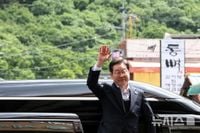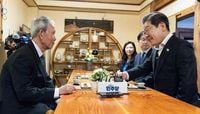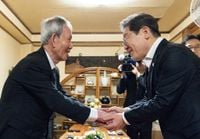In a significant gathering on May 10, 2025, Lee Jae-myung, a prominent presidential candidate from the Democratic Party, engaged in a tea meeting with Kim Jang-ha in Jinju, South Gyeongsang Province. This meeting not only highlighted Lee's political aspirations but also underscored the strong connections he has within the legal community.
Kim Jang-ha, who has dedicated nearly 60 years to running a Korean medicine clinic in Jinju, is well-known for his philanthropic efforts, particularly in providing scholarships to students and supporting various sectors of the local community, including culture, arts, women's rights, history, and media. During their conversation, Lee expressed admiration for Kim, stating, "Kim Jang-ha is a close friend of Moon Hyung-bae and has fostered many outstanding students."
Lee's connection to Moon Hyung-bae, a former acting president of the Constitutional Court, was a focal point of their discussion. Lee reminisced about his relationship with Moon, noting, "I haven't been in contact with him since he went to the Constitutional Court, but I did meet him once in Busan. You have raised an excellent student in him." This comment reflects not only Lee's respect for Moon but also his acknowledgment of the significant role that educators play in shaping future leaders.
The conversation took a deeper turn when they discussed the state of democracy in Korea. Kim remarked that the decision-making process in democracy has been neglected, emphasizing the need for correction. He stated, "The essence of democracy, which is majority rule, has been undermined, and it worries me." Lee concurred, adding, "Historically, there have been many instances where the powerful minority oppresses the majority. However, sometimes the powerless minority manages to reclaim their rightful place, as seen in recent events." This exchange highlights their shared concern about the current political climate and the importance of inclusive governance.
As the discussion progressed, Kim stressed the necessity of accepting electoral outcomes, stating, "We must learn to accept results. People are not accepting outcomes anymore." Lee responded with gravity, saying, "That's the problem. In a world where we don't accept each other, war is the only outcome left." This poignant exchange underscores the tension in contemporary Korean politics, where acceptance of electoral results has become a contentious issue.
Following their private tea meeting, Lee addressed the public at the Uiryeong Traditional Market, greeting citizens and reinforcing his commitment to their concerns. He emphasized the importance of community engagement, stating, "It's essential to listen to the voices of the people and ensure that their needs are met through effective governance." This public appearance not only showcases Lee's accessibility as a candidate but also his understanding of grassroots issues.
In a separate yet related context, Lee shared insights about his relationship with Moon Hyung-bae, clarifying that their friendship is marked by mutual respect and caution. He recounted a recent conversation where he inquired why Moon did not attend an event where Lee was honored. Moon's response was revealing: he expressed concern about causing misunderstandings, reflecting a careful approach both men take in their professional interactions.
Lee elaborated on this point, explaining, "Both Moon and I are cautious to avoid misunderstandings, akin to how one would avoid stepping on stones while digging for rice." This metaphor illustrates the delicate balance required in political relationships, especially among those who have shared professional backgrounds.
Moreover, Lee's comments on societal issues resonate deeply with the public. He conveyed a strong message about the need for a society free from unnecessary burdens, stating, "Our society should not force people to dig up rice with stones. We must ensure that our systems are fair and equitable." This sentiment reflects a broader desire for reform and improvement in societal structures.
In conclusion, the tea meeting between Lee Jae-myung and Kim Jang-ha serves as a microcosm of the larger political landscape in South Korea. It illustrates the intertwining of personal relationships and political discourse, as well as the ongoing struggles within the democratic framework. As Lee continues his campaign, the themes of acceptance, community engagement, and reform will likely play crucial roles in shaping his platform and resonating with voters.



